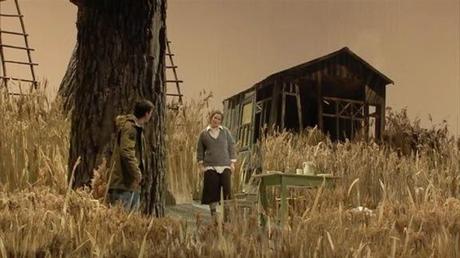by Paul J. Pelkonen

Boy meets girl: Vladimir Vaneev and Svetlana Ignatovich in The Legend of the Invisible
City of Kitezh and the Maiden Fevroniya.
Nicknamed "the Russian Parsifal." because of its mystic plot and Christian connotations (Rimsky was no Wagnerian but couldn't resist quoting Parsifal in the Act III chorus) Rimsky's opera combines two fairy tales: the story of a Russian peasant girl who marries a Prince and a disappearing city that offers salvation from invading Tartar hordes. And to make things even more confusing, there are two cities in Vladimir Belsky's libretto, both confusingly named "Kitezh". Malya Kitezh ("Little Kitezh") is an outlying settlement. Bolshoy Kitezh ("Greater Kitezh") is the "Invisible City" of the title, which shrouds itself in mists to protect the citizenry from the invading Tartar hordes. The story is based on a legendary Russian incident where the forces of Batu Khan were thwarted from sacking the city when it appeared to sink beneath the waves of Lake Svetloyar.
Instead of telling the story in a straightforward manner, Mr. Tcherniakov turns the middle acts into a documentary-like depiction of the horrors of war. Close camera work and high-definition imagery shocks the viewer with casual cruelty, portraying humanity at its most inhumane. The director it pulls no punches--the graphic rape-and-murder sequence in the third act (which is not in the libretto and plays like something out of Game of Thrones) is genuinely brutal stuff--but the intensity of the message stays with the viewer afterward. Mr. Tcherniakov's vision is aided by a strong cast and a robust performance of this magnificent score by the Netherlands Philharmonic Orchestra. under the baton of Marc Albrecht. Mr. Albrecht chooses careful control over blood and thunder, bringing out the delicate melodic curves of Rimsky's music--a flower of late Russian romanticism at its very best.
The huge cast is led by soprano Svetlana Ignatovich as Fevroniya. This is a breakout role for this young talent, who stepped in for Kristine Opolais for these performances and deserves to launch an international career. First seen as a simple girl living in the fields after a vague but implicit environmental disaster, she meets and falls in love with the hunting Prince Yuri (Vladimir Vaneev) who has just been attacked by a bear. The opening, pastoral scenes--staged here on a bleak landscape (it looks like a location from one of Stephen King's Dark Tower novels) have an immediate appeal as does Ms. Ignatovich's fresh, youthful soprano. She is absolutely right for this crucial part, a beacon of religious faith even when her story takes a turn for the worse.
Mr. Vaneev brings an easy fervor and un-pressured approach to the generally difficult role of Yuri. Prince and maiden share an exquisite fairy-tale duet in the first act, providing the listener with introduction to the simple ardent o love of the two characters and making the fairy-tale romance believable. She and the Prince elope to Malay Kitezh, presented here as a decayed, claustrophobic Russian city whose populace spend most of its time inebriated.
In the second act, the focus shifts to the warrior prince Vsevolod (Maxim Aksenov) and his failed attempts to defeat the invading Mongols. This noble figure contrasts wit the drunken, venal Grishka (John Daszak) who betrays the city to the Mongols (represented as terrorists with machine-guns and balaclavas) and led by the redoubtable Russian bass Vladimir Ognovenko. (Their costuming gets more random and bizarre in the third act: one Mongol raider appears dressed as Santa Claus, and another is decked out in what appears to be a 1980s Wayne Gretzky Edmonton Oilers jersey.)
In the third act, the drama finally turns toward redemption. Here, the cathedral square of Bolshoy Kitezh is envisioned as another claustrophobia-inducing environment. It is a refugee camp, with packed in beds and the clamoring, terrified citizenry awaiting attack. This scene features two great vocal performances, with mezzo-soprano Mayram Sokolova at the Page, and baritone Alexey Markov as the blinded huntsman Poyarok. His palpable terror and bloody eye sockets make for one of this disc's most compelling images.
In the long tableau that follows, Rimsky's use of divided strings and church modes make for gorgeous listening in the slowly rising chorus that ranks as one of the composer's most exquisite musical moments. This sequence stands in contrast to the second half of the act, where the Tartars arrive and everything goes to hell.
The finale of this opera returns to the woods and to the final death and redemption of Fevronaya. Here, Ms. Ignatovich is radiant, singing her last scenes with glorious tone despite the vocal handicap of having to lie on her back, In this finale, Margaraita Kekrasova and Jennifer Check appear as angels leading her to the afterlife--a replica of the small wooden hut she started in--where she is reunited with all the characters killed during the invasion. This also brings the welcome return of Mr. Vaneev, in sublime voice at the end of a very long evening. The sublime orchestra playing and simple stage pictures make the long hellish road that she has walked worth the journey. As a tableau of final redemption, it is perfect and very moving.

